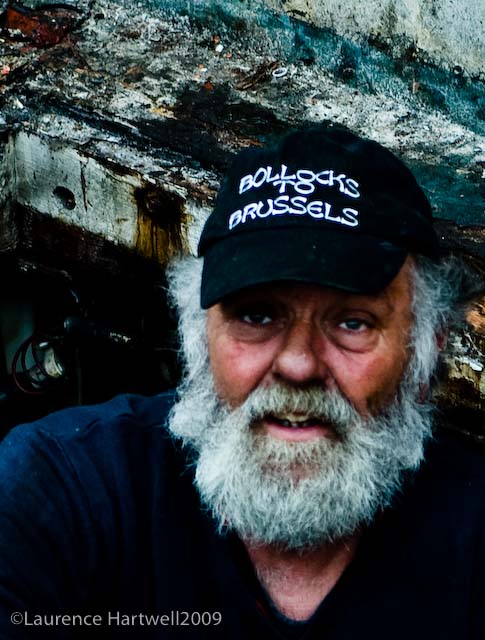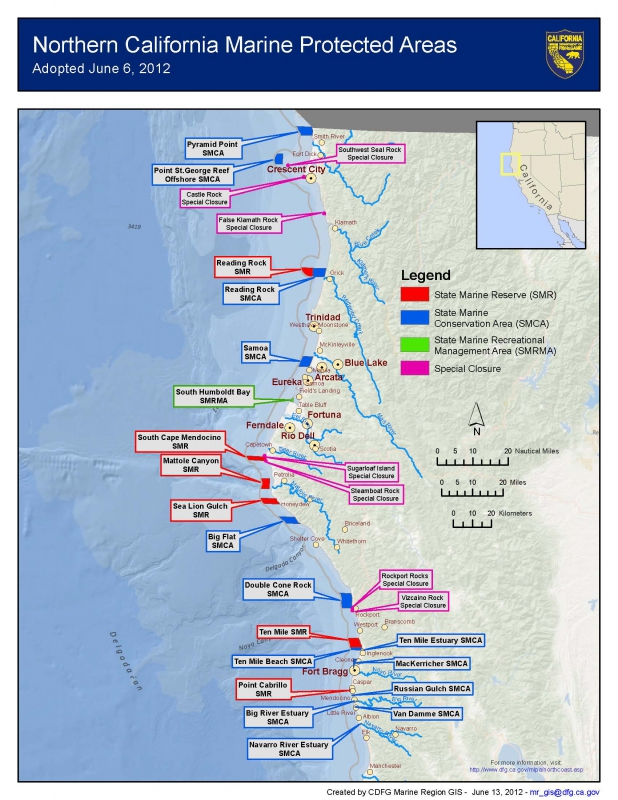New 'Marine Reserve' Network Doesn’t Protect The Ocean
by Dan Bacher
A new network of controversial "marine protected areas" went into effect on the North Coast from Point Arena to the Oregon border on December 19, completing the statewide network from the Oregon to the Mexican border created under the privately funded Marine Life Protection Act (MLPA) Initiative.
The completion of the network was accompanied by a flurry of press releases from the Department of Fish and Game (now Department of Fish and Wildlife), Natural Resources Agency and corporate environmental NGOs and “puff pieces” by the mainstream media regurgitating the agency news releases.
“We have completed the nation’s first statewide coastal system of marine protected areas,” claimed Cat Kuhlman, deputy secretary for oceans and coastal matters at the California Natural Resources Agency, in a release from the agency. “What this means for the future of California’s oceans and the coming generations that will enjoy them, is thrilling."
While many reporters and editors in the corporate media faithfully repeated agency propaganda without doing any actual research, an LA Times puff piece entitled, “California's marine reserve network now complete," outdid them all in its failure to cover the controversy behind the MLPA Initiative.
The article claims "California officials today completed the largest network of undersea parks in the continental United States — 848 square miles of protected waters that reach from the Oregon state line to the Mexican border." (
http://www.latimes.com/news/local/la-me-undersea-parks-20121219,0,4717471.story)
However, this article, as previous ones in the Times and other media outlets, fails to address any of the real, substantial criticisms of the MLPA Initiative process by grassroots environmentalists, Indian Tribe members, commercial fishermen, recreational anglers and advocates of democracy and transparency in government.
The reporter, Kenneth R. Weiss, portrays a false conflict of "fishermen versus environmentalists" over the MLPA Initiative when the real conflict is one of public policy between those that favor greenwashing and the privatization of conservation and those who oppose greenwashing and the privatization of conservation. The reporter fails to mention any of the "inconvenient truths" about the MLPA Initiative.
First, the Times falsely portrays the new closed zones as "undersea parks" when they are anything but. In violation of the letter and spirit of the landmark Marine Life Protection Act of 1999, these so-called "marine protected areas” do not protect the ocean from oil spills and drilling, military testing, corporate aquaculture, wind and wave energy projects and all other impacts on the ocean other than fishing and gathering.
“Marine protected areas can in some instances be beneficial for specific areas, species or ecosystems,” said Zeke Grader, Executive Director of the Pacific Coast Federation of Fishermen’s Associations. “However, the problem we have here is that these ‘marine protected areas’ are in essence no fishing zones and they don’t protect for water quality and other types of development or insults to the environment from activities such as seismic testing.”
Second, the Times fails to mention that the MLPA Blue Ribbon Task Forces that oversaw the implementation of these "marine protected areas" included a big oil lobbyist, marina developer, real estate executive and other individuals with numerous conflicts of interest.
Catherine Reheis-Boyd, the president of the Western States Petroleum Association, chaired the MLPA Blue Ribbon Task Force that developed the MPAs that went into effect in Southern California on January 1, 2012. Reheis-Boyd, a relentless advocate for offshore oil drilling, hydraulic fracturing (fracking), the Keystone XL Pipeline and the weakening of environmental laws, also served on the MLPA Blue Ribbon Task Forces for the Central Coast, North Central Coast and North Coast.
Reheis-Boyd on December 10 claimed that "hydraulic fracturing is safe for California" in her letter to the editor in the Sacramento Bee, in spite a multitude of evidence documented in the film Gasland and in numerous reports documenting the hazards of fracking (
http://www.sacbee.com/2012/12/10/5040406/hydraulic-fracturing.html)
"Hydraulic fracturing has been employed in California for 60 years and there has never been evidence that it has caused harm to water supplies or the environment," she said.
Many grassroots environmentalists and fishermen believe that Reheis-Boyd was appointed to the task force to make sure that the oil industry's interests were protected and to ensure that recreational and commercial fishermen and seaweed harvesters, the most vocal opponents of offshore oil drilling and fracking, are removed from many areas on the ocean to clear a path for ocean industrialization.
David Gurney, independent journalist and co-chair of the Ocean Protection Coalition, blasted Reheis-Boyd's role in pushing for increased fracking in California. (
http://noyonews.net/?p=8215)
"Last week, Secretary of the Interior Ken Salazar announced new lease-sales for Bureau of Land Management lands in California for 'fracking' development," said Gurney. "Offshore areas are showing up on maps: reservoirs of underwater natural gas deposits, that lie under the ocean off Santa Barbara and Southern California."
"It's clear that government and petroleum officials want to 'frack' in the very same areas Reheis-Boyd was appointed to oversee as a 'guardian' of marine habitat protection for the MLPA 'Initiative,'" emphasized Gurney.
Third, the Times claims that "Michael Mantell, a Sacramento lawyer who coordinates philanthropy and conservation, organized the David and Lucile Packard Foundation, the Gordon and Betty Moore Foundation, the Marisla Foundation and two others to pick up the state's costs, including paying for panels of local leaders to take testimony and make recommendations. So far, the foundations have spent more than $23 million."
However, the reporter doesn’t mention that this money was funneled through the shadowy Resources Legacy Fund Foundation. This is an inherent conflict of interest, since this foundation also funds many of the "environmental" NGOs who lobbied for the creation of marine reserves with the least possible protection from all other human impacts on the ocean other than fishing.
The Resources Legacy Fund Foundation also funds, along with the Stephen Bechtel Jr. Foundation and the David and Lucile Packard Foundation, the Public Policy Institute of California (PPIC) studies advocating the construction of a peripheral canal or tunnel.
Fourth, the Times failed to mention that the Northern California Tribal Chairman's Association, including the Chairs of the Elk Valley Rancheria, Hoopa Valley Tribe, Karuk Tribe, Smith River Rancheria, Trinidad Rancheria, and Yurok Tribe, believes the science behind the MLPA Initiative developed by Schwarzenegger's Science Advisory Team is "incomplete and terminally flawed." (
http://yubanet.com/california/Dan-Bacher-MLPA-Initiative-based-on-incomplete-and-terminally-flawed-science.php)
The Yurok Tribe said it has attempted on numerous occasions to address the scientific inadequacies with the MLPA science developed under the Schwarzenegger administration by adding "more robust protocols" into the equation, but was denied every time.
For example, the MLPA Science Advisory Team in August 2010 turned down a request by the Yurok Tribe to make a presentation to the panel. Among other data, the Tribe was going to present data of test results from other marine reserves regarding mussels.
To make matters even worse, the Del Norte County District Attorney arrested Ron LeValley, Co-Chair of the MLPA Science Advisory Team, in February 2012 for conspiracy with two others, Roland Raymond and Sean McAlllister, to embezzle nearly $1 million from the Yurok Tribe.
In the latest development in this scandal, District Attorney Jon Alexander said the state case was dismissed without prejudice against Roland Raymond, 50, to "allow the case to move forward through the U.S. Attorney's Office," according to the Eureka Times-Standard. (
http://www.times-standard.com/localnews/ci_22338240/state-charges-raymond-levalley-mcallister-dismissed-1m-embezzlement)
Wouldn't it have been prudent for the Natural Resources Agency and Department of Fish and Wildlife to postpone the implementation of the alleged North Coast "marine protected areas," considering the charges impending against LeValley - and when the legitimacy of the "science" of the MLPA Initiative was already facing severe criticism from respected scientists?
The LA Times, by failing to do any research into the conflicts of interest and multitude of public policy problems that plagued the MLPA Initiative, performs a great disservice to its readers and effectively greenwashes this privately funded, rigged process.



